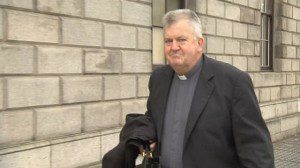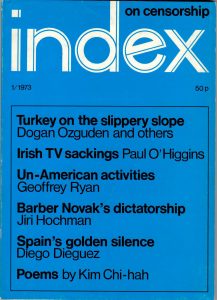13 Feb 2012 | Index Index, minipost
A second cleric is suing Irish public service broadcaster RTE for libel, after they accused him of child abuse. Former Archbishop Richard Burke claims he was named in the same Prime Time Investigates programme as Father Kevin Reynolds, whom RTÉ alleged had fathered a child while a missionary in Kenya. Burke admitted to having a sexual relationship with a woman whilst working in Nigeria, but claimed she was an adult at the time and that the relationship was consensual. ‘Mission to Prey’ claimed that the cleric had abused a minor.
14 Dec 2011 | Uncategorized
As the controversy surrounding high profile defamation case of RTE and Father Kevin Reynolds continues, Michael Foley explores the involvement of the Irish government
(more…)
15 Mar 1973 | Magazine Editions, Volume 2.01 Spring 1973
[vc_row][vc_column][vc_column_text]

Turkey on the slippery slope, the Spring 1973 issue of Index on Censorship magazine
The present conflict in Northern Ireland has caused problems for television (and other media) in both the United Kingdom and in the Republic of Ireland. How far is it lawful or legitimate for the media to go in their presentation of all aspects of the Northern Irish question? And in particular, how far may they include the views and opinions, including those derived through interviews, of organisations which are outlawed and unlawful in both the Irish Republic and Northern Ireland? Clearly, to understand the current campaigns of violence in Northern Ireland and how peace may ultimately be restored, the views of such bodies as the Provisional Irish Republican Army are very relevant. But it was an attempt to find out something about them that led on 24 November 1972 to the dismissal by the Irish Minister for Posts and Telegraphs of the entire nine-man Authority, or board, responsible for the running of the Irish Broadcasting and Television Service, Radio Telefis Eireann, and their replacement by another group of people.
Paradoxically the Irish Prime Minister, Mr Lynch, described the dismissal of the RTE Authority as an ‘exercise in democracy.’ and as an act which was taken because ‘the Government saw the need for protecting our community’. The specific charge on which the RTE Authority were dismissed was that, by interviewing Sean Mac Stiofain, leader of the Provisional IRA, they had disobeyed a Government direction ‘not to project people who put forward violent means for achieving their purpose’.
The law governing the activities of RTE is to be found in the Broadcasting Authority Act of 1960 (amended in 1966). The RTE has the function of maintaining a national television and sound broadcasting service and as such has a monopoly in the state, there being no alternative television or radio channels. Section 18 of the 1960 Act requires the RTE Authority to secure that, when it broadcasts any information, news or feature which relates to matters of public controversy or is the subject of current public debate, the information, news or feature is presented objectively and impartially and without any expression of the Authority’s own views.
This is somewhat similar to the obligation to which the BBC is subjected, not to editorialise on matters of political controversy. Just as in Britain, where the Postmaster General may order either the BBC or the Independent Broadcasting Authority by notice ‘to refrain from’ transmitting ‘any matter or matter of any class specified in such notice’, the RTE Authority is subject to Ministerial control. Section 31 of the Broadcasting Authority Act 1960 provides:
The Minister may direct the Authority in writing to refrain from broadcasting any particular matter or matter of any particular class, and the Authority shall comply with the direction.
As a back-up to his powers the Minister of Posts and Telegraphs, under Section 6, ‘may at any time remove a member of the Authority from office’, with no need to give any reason.
In exercise of his power under Section 31 the Minister on 1 October 1971 issued a direction requiring RTE to refrain from broadcasting any matter of the following class, i.e. any matter that could be calculated to promote the aims or activities of any organisation which engages in, promotes, encourages or advocates the attaining of any particular objective by violent means.
The reaction of the RTE Authority to the receipt of this direction was to point out the vagueness of the direction, and the difficulties of interpretation, starting with the phrase ‘ any matter that could be calculated to promote’:
Indeed the Authority thinks that the terms of the direction generally are so imprecise as to be unsatisfactory in principle and to place an unfair burden on the Authority …
There is also the lack of geographical limitation as to the activities to which the direction applies. The Authority assumes that the Government would not intend that RTE should not broadcast, for example, interviews with or statements from members of the various liberation movements
around the world. …
The Authority is also concerned about the selective aspect of the Government’s action. Newspapers on sale here regularly carry material equivalent to what RTE could not now apparently carry in the form of broadcast matter. Furthermore, about half the population of the State is within reach of external broadcasting services to which the direction cannot apply.
Despite the Authority’s concern the Minister did not clarify the difficulties of interpretation posed by his direction. The Authority explained the direction to its own staff, inter alia, in the following terms:
The primary intention of the direction is to prohibit the direct participation in broadcasting of persons who through that participation would succeed in promoting the aims or activities of those organisations described in the direction: the direction does not affect the broadcasting of news material which is reportage and analysis of violent events, even where the event is stated to be the action of an organisation of the type referred to in the direction….
The direction does not prohibit current affairs programmes which feature the activities and policies of the organisations in question, included as being relevant to the scope of such programmes, provided the strictest care is taken to have the matter handled in such a manner that reasonable people would not regard the programmes as promoting the aims or activities of these organisations.
[/vc_column_text][/vc_column][/vc_row][vc_row][vc_column width=”1/4″][vc_icon icon_fontawesome=”fa fa-quote-left” color=”black” size=”xl” align=”right”][/vc_column][vc_column width=”3/4″][vc_column_text]
No unfavourable comment was apparently made at any time by the Minister upon the terms of this interpretation by the RTE Authority of the scope of his direction.
[/vc_column_text][/vc_column][/vc_row][vc_row][vc_column][vc_column_text]
In November 1972 the British Prime Minister, Mr Heath, visited Northern Ireland and made an important policy statement on the possible developments in Northern Ireland. As part of their coverage of this, RTE conducted interviews with leading political figures in Northern Ireland and in the Republic. In addition, as Mr Donal O Morain, chairman of the dismissed RTE Authority, explained:
In the interests of comprehensive reportage it was thought desirable to ascertain whether Mr Heath’s statements had altered the viewpoint of the Provisional IRA in any way. The method decided upon was to interview Mr Sean Mac Stiofain and to report in the ‘This Week’ programme of 19 November the substance of his replies.
The RTE Authority was apparently unhappy about certain editorial decisions in connexion with the programme concerned, and their displeasure was conveyed to the staff involved, although it is still not clear publicly in what respect the programme was seen as having gone too far. It was this programme on 19 November which led to the dismissal of the RTE Authority.
The only coherent explanation given by the Minister for his action was in the lower house of the Irish Parliament, Dail Eireann, on 14 December 1972, when he explained that he had a personal responsibility to ensure that opportunity was not given to people of violence to use RTE as a recruiting platform and thereby to increase the death toll in Ireland. It was never explained in what sense the broadcasting of the Mac Stiofain interview encouraged recruiting for the IRA. There was widespread condemnation of the Government’s action. The Irish Times editorialised:
If the Government felt that the RTE Authority could not be counted upon to run an impartial service within the bounds which the present regulations set, it is as clear to others that the Government cannot be trusted to use wisdom in its handling of public communications.
The high-handed and arbitrary conduct of the Irish Government did not come as a bolt from the blue. For a long time the Irish Government has adopted a curious view of the function of RTE. In October 1966 the then Irish Prime Minister, Mr Sean Lemass, told the Irish Parliament:
Radio Telefis Eireann was set up by legislation as an instrument of public policy and as such is responsible to the Government The Government has overall responsibility for its conduct, and especially the obligation to ensure that its programmes do not offend against the public interest or conflict with national policy as defined in legislation. To this extent the Government reject the view that RTE should be, either generally or in regard to its current affairs and news programmes, completely independent of Government supervision … It has the duty while maintaining impartiality between political parties … to sustain public respect for the institutions of Government and, where appropriate, to assist public understanding of the policies embodied in legislation enacted. The Government will take such action … as may be necessary to ensure that RTE does not deviate from the due performance of this duty.
The significance of this statement is sharpened when it is remembered that it was made in reaction to criticism of unlawful interference by a Minister in the broadcasting of material by RTE after the Broadcasting Authority Act had made it clear that the only permissible method of interfering with programme content was by the issue of a direction in writing to the Authority.
A footnote to the dismissal of the RTE Authority is to be found in the case of Mr Kevin O’Kelly, the RTE reporter who had conducted the controversial interview with Mac Stiofain. At the trial of Mac Stiofain for belonging to an illegal organisation, Mr O’Kelly refused to identify the man in court as the Mac Stiofain who had given him the interview. For his refusal Mr O’Kelly was sentenced to prison for three months for contempt of court. This in turn led to protests, including stoppages of work, by journalists and members of the staff of RTE.
The RTE affair underlines the need for the mass media to be shielded against direct interference by Government, a problem which in formal terms has not been resolved in either Britain or Ireland. The responsibilities that broadcasting incurs to provide a wide coverage of differing opinions on controversial issues raise special problems when dealing with unlawful organisations within the State. The notion that mere representation of the views of such bodies necessarily provides an opportunity for recruiting new supporters shows a curious lack of faith in the democratic process on the part of those purporting to be its defenders. In any case, what the public interest requires should not be confused at any one moment with what the Government currently in power considers to be in its interest.
[/vc_column_text][/vc_column][/vc_row]


